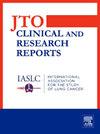Novel Approach to Proficiency Testing Reveals Significant Variations in Biomarker Practice Leading to Critical Differences in Lung Cancer Management
IF 3.5
Q2 ONCOLOGY
引用次数: 0
Abstract
Introduction
Timely access to quality biomarker testing in NSCLC is critical to patient outcomes. The Canadian Pathology Quality Assurance provides external quality assurance (EQA) to laboratories in Canada. The Canadian Pathology Quality Assurance has recently developed a novel approach to molecular biomarker EQA testing, assessing accuracy, turnaround time, and interpretation of reports. This study reports the results of the first end-to-end biomarker EQA challenge in NSCLC.
Methods
Three challenge specimens were made using NSCLC tissue and paired with clinical vignettes mimicking referred-in cases. Participants were to provide all required molecular testing (immunohistochemistry and gene sequencing) and submit final reports for each case, while being timed. Reports were assessed by molecular pathologists and medical oncologists who recommended a systemic treatment based on vignettes and reports.
Results
A total of 13 Canadian laboratories participated. The turnaround time of molecular reporting ranged from five to 57 (median 22.5) calendar days. Two laboratories (15%) reported their results within 2 weeks. Four laboratories (31%) reported the results of their biomarkers after more than 30 days.
Only three laboratories received optimal status (23%). One laboratory (8%) failed due to a critical genotyping error, three (23%) received a suboptimal status due to inappropriately long turnaround times, and the remaining six (69%) received an adequate status.
Conclusions
This report demonstrates the utility of this proficiency testing style compared with standard laboratory self-reporting. The approach has elucidated substantial differences in the quality of NSCLC biomarker results produced by Canadian laboratories. Ongoing efforts to improve turnaround times and clarity of reporting, including regular external measurement, are tools that can improve patient outcomes in NSCLC.
能力测试的新方法揭示了生物标志物实践的显著差异,导致肺癌管理的关键差异
及时获得高质量的非小细胞肺癌生物标志物检测对患者预后至关重要。加拿大病理学质量保证为加拿大的实验室提供外部质量保证(EQA)。加拿大病理质量保证组织最近开发了一种新的分子生物标志物EQA测试方法,评估准确性、周转时间和报告解释。本研究报告了NSCLC中首个端到端生物标志物EQA挑战的结果。方法采用非小细胞肺癌(NSCLC)组织制作3个攻毒标本,并与模拟转诊病例的临床标本配对。参与者提供所有必需的分子检测(免疫组织化学和基因测序),并提交每个病例的最终报告,同时计时。报告由分子病理学家和医学肿瘤学家评估,他们建议基于小片段和报告进行系统治疗。结果加拿大共有13家实验室参与。分子报告的周转时间从5到57(中位数22.5)日历天不等。2个实验室(15%)在2周内报告结果。四家实验室(31%)在30多天后报告了其生物标志物的结果。只有三个实验室获得了最佳状态(23%)。1个实验室(8%)由于严重的基因分型错误而失败,3个实验室(23%)由于不适当的长周转时间而处于次优状态,其余6个实验室(69%)处于适当状态。结论与标准实验室自我报告相比,本报告证明了这种能力测试方式的实用性。该方法阐明了加拿大实验室产生的NSCLC生物标志物结果质量的实质性差异。正在进行的改善周转时间和报告清晰度的努力,包括定期的外部测量,是可以改善NSCLC患者预后的工具。
本文章由计算机程序翻译,如有差异,请以英文原文为准。
求助全文
约1分钟内获得全文
求助全文
来源期刊

JTO Clinical and Research Reports
Medicine-Oncology
CiteScore
4.20
自引率
0.00%
发文量
145
审稿时长
19 weeks
 求助内容:
求助内容: 应助结果提醒方式:
应助结果提醒方式:


